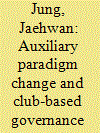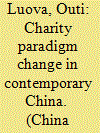| Srl | Item |
| 1 |
ID:
192881


|
|
|
|
|
| Summary/Abstract |
After the 2008 global financial crisis, the newly revised Basel III international regulatory framework for banks enhanced the macroprudential objective of addressing the systemic risk inherent in financial markets. This revision of the Basel framework was lauded as an example of a paradigm change from an efficient market consensus to a macroprudential consensus in global banking regulation. However, this so-called Basel consensus merely tweaked the market-friendly nature of the Basel II framework rather than fundamentally overturning it due to the inadequacy of macroprudential ideas as an alternative paradigm. This inadequacy could be largely attributed to the manner in which global financial reforms were discussed and formulated. The club-based model of financial regulation governance enabled financial technocrats, informed by the precrisis paradigm, to maintain their privileged positions in the postcrisis reform process. Consequently, postcrisis reform proposals were built upon the existing paradigm, making the 2008 financial crisis a conservative rather than transformative event.
|
|
|
|
|
|
|
|
|
|
|
|
|
|
|
|
| 2 |
ID:
153635


|
|
|
|
|
| Summary/Abstract |
This article addresses a remarkable conceptual change in China: the replacement of the perception of charities as organizations associated with anti-governmental activity by one that views charities as organized expressions of civic duty. This shift occurred within a period of just 20 years. Following theories of public policy paradigm change, this study analyses the specific societal, institutional and rhetorical changes that were required for the rehabilitation of charity in China; the articulation of a blueprint for the new paradigm; and the implementation of the model in practice, focusing on attempts to foster a charitable spirit and culture. This study is based on official documents and articles in the People’s Daily (人民日报). Furthermore, the analysis is complemented by interviews with staff members of charity associations carried out in Tianjin in 2007 and 2008. The findings contribute to the broader discussion of the features of China’s civil society by elaborating on the boundaries of acceptable civic action. The study shows how the party-state has permitted the emergence of a space for the expression of a voluntary charitable spirit while still expecting that charitable spirit to be expressed within the confines of state-defined morally correct acts.
|
|
|
|
|
|
|
|
|
|
|
|
|
|
|
|
| 3 |
ID:
142155


|
|
|
|
|
| Summary/Abstract |
Historically the role of the Kurds and Kurdish parties in Syria has been shaped by the Syrian government's regional power politics. Within Syria, the status of the Kurdish population ranges from being tolerated to being actively oppressed. At the same time, the Syrian government used the Kurdistan Workers' Party (PKK) as a proxy to wage war in response to Turkey's “water-dam politics” that left Syria vulnerable to droughts. Within this complicated and ever-changing power landscape, the Kurds and the PKK had to adapt their aims and strategies.1 However, with the loosening grip of the Assad regime in 2011, the situation changed, and Syria's Kurds were able to take control of the Kurdish-majority areas. In particular, parties affiliated with the PKK were able to make the most of the situation. In late 2014, the Kurdish-controlled areas, with the exception of the besieged town of Kobane, are some of the few parts of Syria that show relative stability.2 Apart from being an effective force against the jihadists of the Islamic State (IS), the Kurdish-led autonomous government is also the only one offering a political alternative to the repressive Assad regime and the violent Islamic State.
|
|
|
|
|
|
|
|
|
|
|
|
|
|
|
|